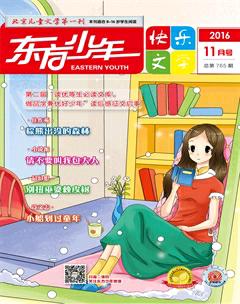汪郁雯&姚佳韵:华裔女孩携手清理海洋
李晓涵
It started with a trip to the dump1).
In 2011, Miranda Wang visited a waste transport station in her hometown of Vancouver. She and her friend Jeanny Yao, now a senior at the University of Toronto, were appalled2) to see the "enormous" amount of plastic accumulating in the facility.
"I realized it doesn't just go to the moon or get thrown away into magic land. It's very much there," Wang said.
So they decided to do something. As seniors in high school, they read through the hundreds of pages of scientific papers and had an idea: find bacteria that could degrade3) plastics. Researchers at the University of British Columbia invited Wang and Yao to use their lab space to start working on their project.
Now four years in, Wang and Yao are turning their high school science project into a multi-million dollar, award-winning business venture4). They are the co-founders of BioCellection, a company that takes plastic pollution out of the ocean and then uses genetically engineered bacteria to break down these plastics into a product used in the textile industry.
"Basically, we upcycle5) plastic pollution into usable materials," Wang said.
BioCellection recently won the Grand Prize and the Social Impact Prize in Pennvention, Weiss Tech House's technology innovation competition. The company was also a finalist for the inaugural Penn Innovation Prize and won the People's Choice Award at College Pitch Philly, a regional business plan competition held in February, 2016.
BioCellection was the top undergraduate team and the winner of the Social Impact Prize in the Wharton Undergraduate Business Plan Competition, and they are competing against seven other teams for the grand prize this Thursday.
"[BioCellection] has been a top winner or runner up6) in pretty much every major competition there is at Penn across all the different schools," said Jeffery Babin, the associate director of the Engineering Entrepreneurship Program in the School of Engineering and Applied Science, who has been advising Wang since last fall. "She's been very tenacious7) about moving this forward while she's still a student."
Though Wang and Yao have been developing their idea steadily throughout college, they officially launched BioCellection last May. This year they took their project to the next level, obtaining two patents and nearly $300,000 in funding.
"We've been preparing for this for a really long time," Wang said.
After graduating in a couple of weeks, Wang and Yao plan to move to San Jose, California, to manage BioCellection full time. Wang will also continue working with a team at Penn that will support further technical development of the upcycling process.
BioCellection's revenue will come from both clearing plastic from the ocean and selling rhamnolipid8), the usable product produced in the upcycling process. Under their business plan, BioCellection aims to become a $100 million company, taking 243,000 tons of plastic out of the ocean annually, by 2020. Wang said they need just three customers to break even9), and they have already been approached10) by several companies, including sports clothing manufacturer Adidas.
"The most sustainable technology comes from sustainable business," she said.
Yao, however, emphasized that the pair's ultimate focus is on the impact of this technology. "[We hope that] people would go to beaches and there would be older people talking about how there used to be plastic pollution and the younger generation would be like, 'Where's the plastic pollution now?'" she said.
Babin added that "she's got a very grand vision11) and is absolutely committed to that vision. And really the vision is to solve the ocean's pollution problems."
"For me, it was natural to couple12) the sense of urgency for how big the problem is to the sense that I can solve problems through science," Wang said. "This has very much become who I am."
1. dump [d?mp] n. 垃圾場;废物堆
2. appalled [??p??ld] adj. 感到震惊的;惊恐万分的
3. degrade [d??ɡre?d] vt. 使降解;使分解
一切都始于一次去垃圾站的经历。
2011年,汪郁雯来到家乡温哥华的一处垃圾中转站。当她和朋友姚佳韵(现为多伦多大学的大四学生,编注:英文原文发表于2016年4月)看到中转站里堆积着的“数量庞大的”塑料垃圾时,俩人大为震惊。
“我意识到这些垃圾不会就那么跑到月球上去,也不会被扔到某个神奇的地方,它们就在那里。”汪郁雯说。
因此她们决定做些什么。当时还是高中毕业班学生的她们从头到尾阅读了成百上千页的科技论文,然后有了一个主意:找到能够降解塑料的细菌。英属哥伦比亚大学的研究人员邀请汪郁雯和姚佳韵使用他们的实验室,好开始研究她们的项目。
如今四年过去了,汪郁雯和姚佳韵正在把她们高中时的科学项目转变为一个价值数百万美元的获奖商业项目。她们共同创立了BioCellection公司,该公司将海洋中的塑料污染物清理出来,然后用基因工程菌将这些塑料制品降解为一种可用于纺织业的产品。
“大致说来,我们是对塑料污染物进行升级改造,将其变成可用的材料。” 汪郁雯说。
BioCellection最近在(宾夕法尼亚大学)伟思科技工场举办的技术创新比赛Pennvention中获得了一等奖和社会影响力奖。该公司还入围第一届宾夕法尼亚创新奖,并在2016年2月举办的地区性商业计划比赛College Pitch Philly中获得大众喜爱奖。
在沃顿本科生商业计划大赛中,BioCellection是本科生团队中最优秀的一支队伍,获得了该比赛的社会影响力奖,并将于本周四与其他七个团队竞争,角逐大奖(译注:现已获得该项大奖)。
“[BioCellection]在宾夕法尼亚州所有学校举办的每一次大型比赛中几乎都获得了冠军或亚军。” 杰弗里·巴宾说。巴宾是工程和应用科学学院的工程创业项目副主任,从去年秋天起一直在给汪郁雯提供指导。“汪郁雯虽然还是个学生,但一直在非常执着地推进这个项目。”
虽然汪郁雯和姚佳韵在大学期间一直在持续酝酿她们的想法,但她们在去年5月才正式成立BioCellection。今年,她们的项目上了一个新台阶,获得了两项专利以及近30万美元的资金。
“我们为此已经准备了相当长的一段时间。”汪郁雯说。
再过几周,汪郁雯和姚佳韵就要毕业了。之后她们计划搬到加利福尼亚州的圣何塞,全职经营BioCellection公司。此外,汪郁雯会继续跟宾夕法尼亚州的一个团队合作,该团队将为升级改造过程进一步的技术开发提供支持。
BioCellection公司的收入一部分来自清理海洋中的塑料垃圾,一部分来自出售鼠李糖脂——升级改造过程中产生的可利用产物。根据她们的经营计划,BioCellection的目标是在2020年前成为一家价值1亿美元的公司,每年从海洋中清理出24.3万吨的塑料。汪郁雯说她们只需有三个客户就可以达到收支平衡,而已经有好几家公司跟她们进行了接洽,其中包括运动服装生产商阿迪达斯。
“最可持续发展的技术诞生于可持续发展的产业。”她说。
然而,姚佳韵强调说她们二人最终关注的还是这项技术带来的影响。“[我们希望]当人们去沙滩上时,会有年长些的人谈起过去的塑料污染,而年轻的一代则会问:‘现在塑料污染去哪儿了?”她说。
巴宾补充道:“汪郁雯有一个宏大的愿景,并且为此全力以赴。确实,这个愿景就是解决海洋污染问题。”
“问题的严重性带来一种紧迫感,同时我也感觉自己可以通过科学来解决问题。对我来说,这两种感觉很自然地结合在一起,” 汪郁雯说,“这已经完完全全成了我的行事方式。”

